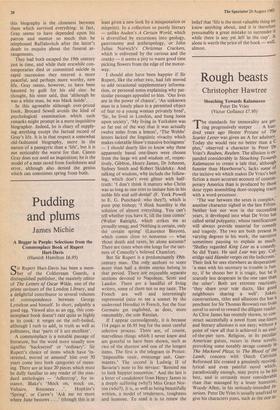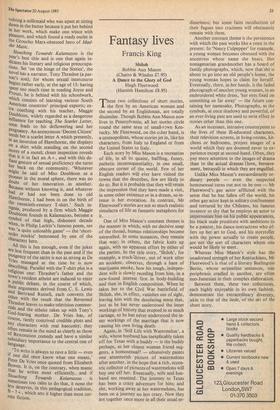Rough beasts
Christopher Hawtree
Slouching Towards Kalamazoo Peter De Vries (Victor Gollancz £7.95)
`rrhe standards for immorality are get- ". ting progressively steeper ... A hun- dred years ago Hester Prynne of The Scarlet Letter was given an A for adultery. Today she would rate no better than a C plus,' observed a character in Peter De Vries's Reuben, Reuben. The allusion is ex- panded considerably in Slouching Towards Kalamazoo to create a tale that, although funnier than Hawthorne's, lacks some of the incisive wit which makes De Vries's best fiction a more accurate account of contem- porary America than is produced by those dour types assembling door-stopping tracts with a word-processor.
'The war between the sexes is complex, another character sighed in the late Fifties. Neither lost nor won in the succeeding years, it developed into what De Vries has called serial polygamy, whose ramifications will always provide material for comedy and tragedy. The two are both present in varying degrees in his work, the narrative sometimes pausing to explain as much. `Shelley regarded King Lear as a comedy. So did Yeats. He said Lear was gay. Col: eridge said Hamlet verges on the ludicrous. Their link he sees elsewhere as desperation: 'a man with his secretary in trouble is fun- ny, if he shoots her it is tragic, but he is scarcely less desperate in the one case than the other'. Both are extreme reactions, `they share your tear ducts, like good neighbours sharing a well'. Jokes, constructions, titles and allusions (he has a penchant for Sir Thomas Browne) run from novel to novel to reward the diligent reader. As Clive James has recently shown, to con' struct successfully a novel from one-liners and literary allusions is not easy; without a point of view all that is achieved is an end' of-the-pier turn. Religion, in its peculiar American guises, recurs in these novels, provoking some notably savage comedy The Mackerel Plaza; in The Blood of the Lamb, concern with Dutch Calvinist Reformed life created a genuinely moving' lyrical and even painful novel which, paradoxically enough, may prove to be his best, and is certainly more considerable than that managed by a lesser humorist, Woody Allen, in his seriously-intended In- teriors. Peter De Vries is usually unafraid to give his characters puns, such as the one in'
volving a milkmaid who was upset at sitting down in the butter because it put her behind in her work, which make one wince with Pleasure, and which found a ready outlet in
the Groucho Marx-obsessed hero of Mad- der Music.
Slouching Towards Kalamazoo is the Year's best title and is one that again in- dicates his literary and religious preoccupa- tions. Set 'on the hinge of the Sixties', the novel has a narrator, Tony Thrasher (a par- son's son), for whom sexual intercourse begins rather early, at the age of 13: having spent too much time in reading Joyce and Proust, he is behind with his schoolwork, Which consists of learning various South American countries' principal exports; ex- tra coaching with his teacher, Maggie Doubloon, widely regarded as a dangerous influence for teaching The Scarlet Letter, soon leads to his deflowering and her Pregnancy. An anonymous 'Decent Citizen' sends her a scarlet letter A which presently, in an inversion of Hawthorne, she displays on a shirt while standing on the second storey of a motel; closer inspection reveals that it is in fact an A + , and with this de- fiant gesture of sexual proficiency she turns her back on the community. 'Whatever 'night be said of Miss Doubloon as a Pioneer in the moral sphere, there was no doubt of her innovation in another. Because without knowing it, and whatever had or had not been done to old Hawthorne, I had been in on the birth of the twentieth-century T-shirt.' Such in- signia, produced by a firm which Maggie Doubloon founds at Kalamazoo, become a symbol of that high, dishonest decade When, in Philip Larkin's famous poem, sex was 'a quite unlosable game' — the 'short- order nookie' bemoaned by one of the characters here.
All this is fun enough, even if the jokes are less frequent than in the past and if the P‘rungency of the satire is not as strong as De "ties managed at the time he is now describing. Parallel with the T-shirt plot is a religious one: Thrasher's father and the town's resident atheist are induced to enter a Public debate, in the course of which, their arguments derived from C. S. Lewis and Bertrand Russell, each converts the other with the result that the Reverend Thrasher leaves to make television commer- cials and the atheist takes up with Tony's God-fearing mother. De Vries has, of course, rarely contrived credible plots and any characters with real haecceity; they often remain in the mind as clearly as those of Restoration comedy and have a similar
subsidiary importance to the central one of language,
To write is always to rave a little — even if one did once know what one meant,' Peter De Vries once quoted from Elizabeth Bowen. It is, on the contrary, when manic that he writes most efficiently, and if Slouching Towards Kalamazoo is sometimes too calm to do that, it none the less deserves, in this pedagogical tradition,
B ? + , which sets it higher than most cur- rent fiction.



































 Previous page
Previous page